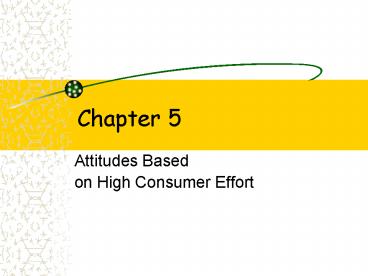Attitudes Based - PowerPoint PPT Presentation
Title:
Attitudes Based
Description:
Title: Criteria for Development of Message Ideas Author: Wayne Hoyer Last modified by: commpower Created Date: 9/22/1997 9:24:48 PM Document presentation format – PowerPoint PPT presentation
Number of Views:71
Avg rating:3.0/5.0
Title: Attitudes Based
1
Chapter 5
- Attitudes Based
- on High Consumer Effort
2
Learning Objectives Ch.5
- Discuss how marketers can apply various cognitive
models to understand influence consumers
attitudes based on high-effort thought processes. - Describe some of the methods for using the
communication source the message to favorably
influence consumers attitudes. - Explain how why a company might try to change
consumers attitudes by influencing their
feelings.
3
(No Transcript)
4
Attitude
- an overall evaluation that expresses how much
we like or dislike an object, issue, person, or
action. - What is your attitude about
- Cell phones?
- Outsourcing customer service?
- Tom Cruise?
- Tennis?
5
What Are Attitudes?
- Importance of attitudesfunctions
- Cognitive
- Affective
- Connative
- Characteristics of attitudes
- Favorability
- Accessibility
- Confidence
- Persistence
- Resistance
- Ambivalence
6
Forming/Changing Attitudes
- Foundations
- Cognitions
- Emotions
- Role of effort
- Elaboration
- Processing routes
- Central route to persuasion
- Peripheral route to persuasion
- Can you think of an example of when each route
applies?
- Influence of consumer attitudes
- Cognitive
- Affect-based
- What is the difference between attitude affect?
7
Approaches to Attitude Formation/Change
8
Cognitive Foundations of Attitudes
- You are in control of your attitude
- Marketers may give you information that may base
your attitude change (persuasion) - Direct or imagined experience
- Reasoning by analogy or category
- Values-driven attitudes
- Social identity-based attitude generation
- Analytical processes of attitude formation
9
Cognitive Foundation Models
- Cognitive Response Model
- Counterarguments
- Support arguments
- Source derogations
- Expectancy-Value Models
- Theory of Reasoned Action
- Attitude specificity
- Normative influences
10
Theory of Reasoned Action (TORA)
11
Components of TORA Model
- BehaviorA function of behavioral intention,
determined by - Attitude Toward Act
- Behavioral Intentions
- Subjective Norms
12
Theory of Planned Behavior (TPB)
- Adds dimension of consumers perceived control
- You control plan your behavior in many contexts
- May assume the consumer is rational
- Perfect versus imperfect information in the
marketplace - One limitation may be the TPB does not place
emphasis on consumer emotions - What are the key differences between TORA TPB?
- Which theory do you prefer why?
13
Changing Consumer Attitudes
- Persuasion is related to attitude change
- There is resistance to change
- Market resistance is resisting the marketplace
- Diagnosing existing attitudes
- Devising strategies for change
- Change beliefs
- Change evaluations
- Add a new belief
- Target normative beliefs
14
How Cognitively Based Attitudes Are Influenced
- Communication source
- Source credibility
- Company reputation
- Sleeper effect (e.g., in political advertising)
- Message
- Argument quality
- One- versus two-sided
- Comparative
15
Affective (Emotional) Foundations of Attitudes
- Affective involvement
- Affective responses
- Emotional appeals
- What is an example of a current brand using an
emotional appeal in advertising? - Are certain industries more prone to benefit from
emotional appeals in their advertising
marketing communications?
16
How Affectively Based Attitudes Are Influenced
- Source
- Attractiveness
- Match-up hypothesis
- Message
- Emotional appeals
- Fear appeals
- Terror Management Theory (TMT)
- Can you name a context where TMT applies?
17
Attitude Toward the Ad
- Dimensions
- Utilitarian (functional)
- Hedonic
- Interest
18
Factors Impacting Consumer Attitude
- Level of Involvement/ elaboration
- Knowledge experience
- Analysis of reasons
- Accessibility of attitudes
- Attitude confidence
- Specificity of attitudes
- Attitude-behavior relationship
- Situational factors
- Normative factors
- Personality variables
19
- This Hartz ad is attempting to change consumers
beliefs that only a veterinarian can provide
effective flea treatment. Hartz presents their
product as a safe, effective, more convenient,
less expensive solution to a pets flea problem.
Courtesy Hartz Mountain
20
Questions?































